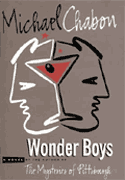 This book review was originally published on Critics’ Choice on July 10, 1995.
This book review was originally published on Critics’ Choice on July 10, 1995.
Three-time novelist Grady Tripp may have lost his writer’s acumen, but his imagination is certainly intact; because it takes a supreme effort of creativity to end up in the massive pickle that Grady, the protagonist of Michael Chabon’s new novel, Wonder Boys, has ended up in.
Grady’s Korean/Jewish wife (his third) has walked out on him after discovering that he’s having an affair. He’s impregnated his lover, who happens to be the wife of his boss at the English department where he teaches. Marijuana and various prescription drugs have set up camp in his head where common sense used to be. And the only trump card he holds, an epic novel-in-progress by the name of Wonder Boys, runs 2,600 pages and is hopelessly unfinished.
Wonder Boys is the second colorfully drafted novel by Michael Chabon, the author of 1988’s surprise bestseller The Mysteries of Pittsburgh. It’s no coincidence that the seven-year gap between Chabon’s novels corresponds with the number of years since Grady’s last published book; Chabon reportedly went through some Trippish troubles of his own with an aborted second novel. But he’s in top form with the quickly penned Wonder Boys, which is sure to cement Chabon’s reputation as one of the brightest young masters of prosody around.
Grady’s problem is that he’s patterned his career after that of one August Van Zorn, a hack horror writer of the ’30s whose affliction with the fiction writer’s mania Grady calls the “midnight disease” only led to poverty, depression, and suicide. Now Grady has picked up a disciple of his own, a writing student named James Leer. Leer has a penchant for Hollywood trivia and obscure postmodern noodling that endears him to Grady at the same time it attracts him to Grady’s bisexual editor, a fellow literary has-been named Terry Crabtree. When the three find themselves on the lam for killing a dog and stealing a black satin jacket (previous owner: Marilyn Monroe), Grady begins to wonder if perhaps the boy could do without his depraved tutelage.
As Grady descends from a wretched failure to a wretched failure and degenerative influence on youth — with a hilarious pit stop at perhaps the most disastrous Passover Seder on record — Chabon treats us to an acutely funny and heartbreaking narrative. His writing darts knowingly between Updikean flourish and Salingerian sting; in one passage of self-description, Grady calls himself “an elephantine piece of machinery… all vacuum tubes and gear work with a plain old analog dial of a face, such a dented, gas-guzzling old Galaxie 500 of a man.”
Chabon still needs to work a bit on his pacing — Wonder Boys makes a slow ascent and comes to an abrupt and clunky landing — but his theme is devastating and devastatingly told: life disappoints. All but a lucky few are ensnared by their dreams, Grady says, but maybe it’s better to have dreamed and failed than to have folded without accepting the challenge.
Had to read this book for class. Wholly unnecessary. I couldn’t quite pinpoint what it was about the book that I so heavily disliked, and then came to the conclusion that I simply disliked the whole thing.
I absolutely loved this book. As soon as I picked it up I didn’t want to put it down. Although Chabon’s style was slightly hard to understand, the storyline was intriguing and different and I just loved it. I loved how different each character was. Chabon has a miraculous imagination and it really shows in Wonder Boys. I was very impressed with this book.
Many people don’t know that Chuck Kinder, one of Chabon’s writing teachers (also mine), was inspiration for Graddy Tripp. I came to this book after reading Kinder’s Honeymooners, which I recommend to anyone who liked Wonder Boys. Chabon’s novel moves so quickly, and yet I wanted to reread every sentence twice. He’s that good of a writer. Liker Kinder, Chabon is a writer’s writer. If you have any sense of good contemporary fiction, you’ll enjoy this book as I did.
I enjoyed Wonder Boys and all its hints to beginning writers. I got lost, however, in the escapades, the chaos, and the reeling intensity of the connected relationships. Though I loved some of the sentences, they seemed a bit deliberately sophisticated and over-written. But, I will read Kavalier and, Clay. So there!